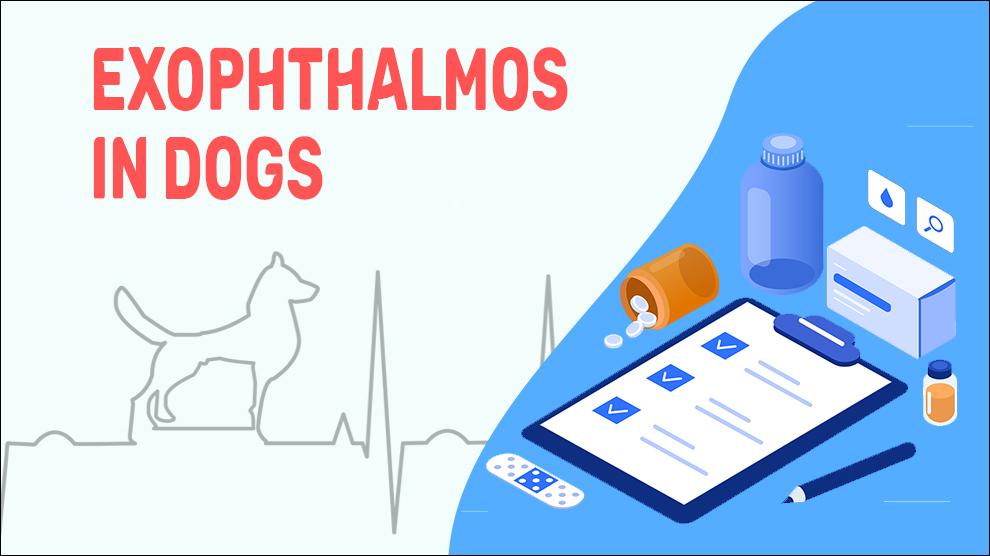Exophthalmos describes a forward dislocation or protrusion of one eyeball or both from the eye socket. The term coined in Greek means ‘bulging eyes’.
The “bug-eyed” dogs such as brachycephalic breeds having prominent protruding eyes with short muzzles should be checked often. These dogs are more prone to Exophthalmos. Identification of Exophthalmos can be easily done by front viewing of the head, the relative prominence of the globe, the size of the palpebral fissure, and comparing the angle of the eyelashes.
Exophthalmos most commonly manifests in a thyroid condition that affects the eyes is known as thyroid orbitopathy such as Graves' disease ophthalmopathy with symptoms such as tearing, bulging eyeballs, and puffy and swollen eyes.
Exophthalmos may be accompanied by third eyelid prolapse, deviation of the globe, conjunctival swelling/ chemosis/ oedema, a widened palpebral fissure, a decreased ability to blink, exposure keratitis, and epiphora.
In general, exophthalmos can be caused by:
- New growth incursion of the orbit, e.g., benign or malignant space-occupying orbital tumors such as neuroblastoma, capillary haemangioma, neurofibromatosis, lymphoma, leukemia, pseudotumors, secondary deposits (metastatic), and mucocele.
- Foreign bodies being forced into orbit, e.g., due to injury.
- Encroachment of inflammation into the orbit, e.g., orbital cellulitis, thyroid-related eye disease, IgG4-related disease, granulomatosis with polyangiitis, and sarcoidosis.
- Obstruction with the venous returning from the orbit, e.g., cavernous sinus thrombosis, carotid-cavernous fistula, orbital varices, etc.
Symptoms Of Exophthalmos
- Eye is bulging out of the orbit
- Bruising/ Swelling of the eyelid
- Discharge from the eye
- Ophthalmoplegia
- Tissue around the eye is red and inflamed
- Protrusion of the third eyelid
- Severed/torn muscles and or eye ligaments
- Unable to close the eyelid over the eye
- Dry eye/ Crossed eyes
- Ulceration of the cornea
- Constricted pupils
- Visual impairment
Treatment Options For Exophthalmos
Treatment can be divided into two modalities- medical and surgical.
Medical treatment:
- Supportive therapy
- Oral and/or Systemic Antibiotics
- Lubricant ointments and/or antibiotic ointments
- Eyelid Sutures to protect the eye and prevent further protrusions
- Sometimes, immunosuppressive therapy (medications that suppress the immune system) with corticosteroids may be necessary
Surgical:
Globe replacement: When the dog has optic nerve damage or three extraocular torn muscles or if the eyeball is ruptured or a detached retina, globe replacement will not be attempted.
Temporary tarsorrhaphy: To protect the cornea, the globe is re-attached and the eyelids of the eye are partially sutured for a time period.
Home Remedies For Exophthalmos
- Increase your dog’s immunity - Feed your Dog the right foods as the gut contains about 70 percent of the dog’s immune system.
- Weight management for your dog is important.
- Supplementing for healthy eyes - help your dog have healthy ocular hygiene with supplements.
- Make your dog more comfortable: Cleanse eyelids—to remove crusts (dried discharge) with lukewarm water with a half-teaspoon of salt.
- Apply warm compresses for 5 to 15 minutes, 3 to 4 times daily, avoiding surfaces of the eyes. Apply cooled chamomile tea to a cotton ball and clean the affected eye.
Prevention Of Exophthalmos
Prevention is not possible for Exophthalmos as the causes in dogs is varied.
Exophthalmos due to the hereditary abnormality can be prevented by stopping the breeding of affected dogs so that the risk of passing the condition on to the next generation is averted.
Affected Breeds Of Exophthalmos
Flat Faced Breeds, Pug, Pekingese, Shih Tzu, Japanese Chin, Boston Terrier, Short Nose Dog Breeds
Additional Facts For Exophthalmos
1. Causes:
Paralytic Exophthalmos
Infection:
- Viral and bacterial infections
- Mastoiditis
- Fungal (Mucormycosis)
- Immunocompromised dogs
Metabolic:
- Hyperthyroidism
- Diabetes mellitus
- Hypertension
Trauma:
- Birth trauma
- temporal bone fracture, Fractures to the skull base
- Facial injuries
Tumour:
- Leukemia
- Carcinoma (primary or metastatic)
- Facial nerve tumor
- Cholesteatoma
- Meningioma
- Haemangioblastoma
- Acoustic neuroma
- Sarcoma
Toxic:
- Arsenic
- Thalidomide
- Alcohol excess
- Carbon monoxide
2. Mortality: There is no mortality due to this condition documented yet
3. Diagnosis:
- Complete blood count and a serum chemistry panel
- Skull x-rays
- Orbital ultrasound
- Biopsy of the eye orbit
- CT SCAN/MRI
4. Prognosis:
Exophthalmos isn't a lethal condition, but it can ultimately lead to eye problems. Discuss with your vet to figure out the underlying cause.
Depending on the cause, Exophthalmos can be treated with either medication to keep the eyes moisturized or surgery.
When To See A Vet
Contact your vet right away, if you notice any of the following:
- Eye is bulging out of the orbit
- Bruising/ Swelling of the eyelid
- Discharge from the eye
Food Suggestions For Exophthalmos
- Fiber-rich foods: Apples, pears, oatmeal, and other foods
- High-quality protein sources: Lean boiled meats- chicken, beef, turkey, or lamb
- Vitamin A: spinach, cantaloupe, carrots, and beef liver
- Vitamin c: red bell pepper, strawberries, kiwis, etc
- Fatty acids – cooked egg yolks, plant oils, sunflower, corn
Conclusion
The cause of the Exopthlamos determines the prognosis.
Proper treatment of Infectious causes of Exophthalmos do extremely well and are not at risk of developing problems in the future.
Congenital abnormality (brachycephalic breeds) caused by Exophthalmos can be surgically corrected, and the prognosis is excellent.
Benign eyelid tumors in dogs can be removed surgically with a good prognosis.

















